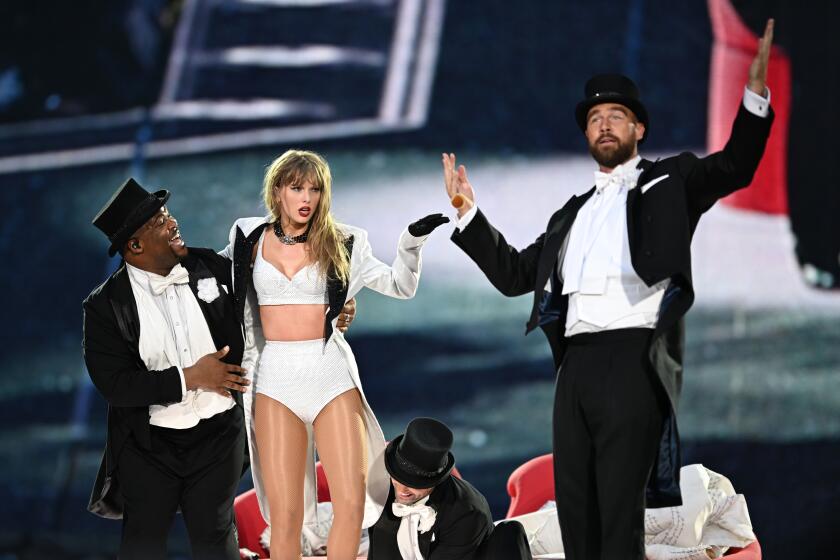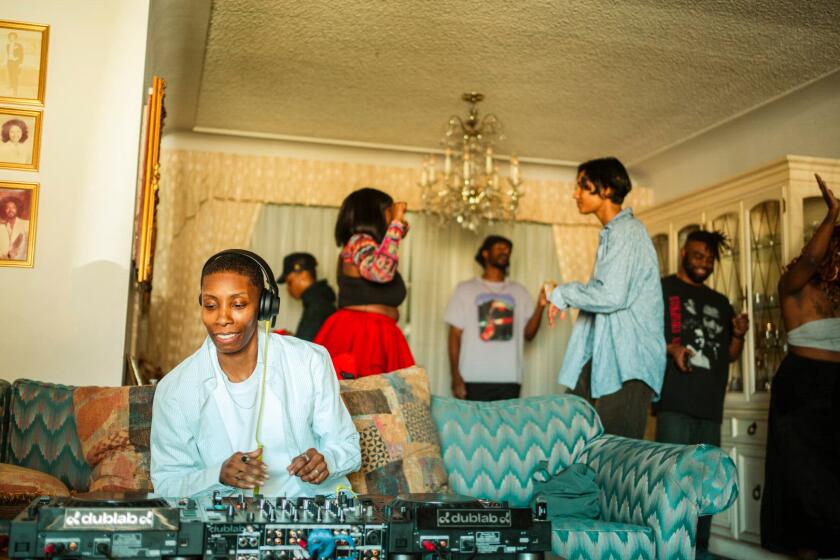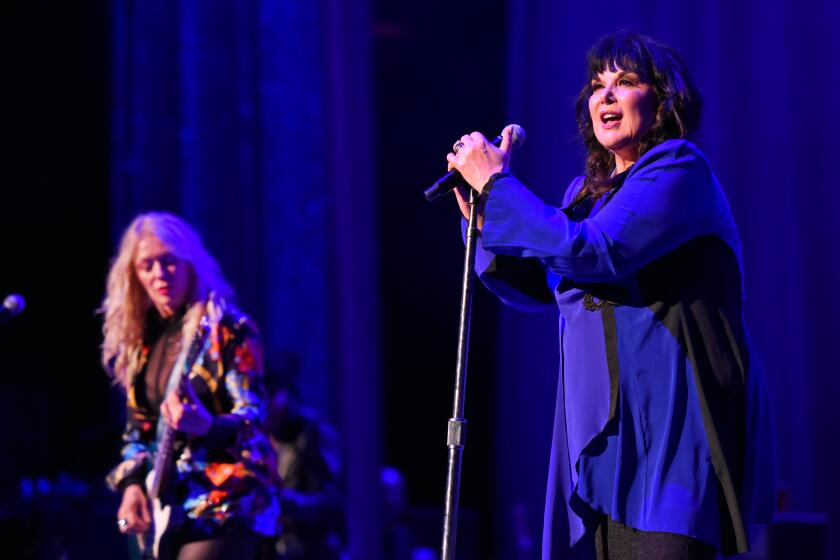Adding Links to the Jazz Chain : Gerald Wilson, Whose Career Spans 50 Years, Forges Ahead With His Orchestra of the ‘90s
Bandleader Gerald Wilson’s career as a composer-arranger began with a desire to be different.
“When I was in high school back in Detroit, I was listening to all the bands that came through: Duke Ellington, Don Redman, Erskine Tate, Earl Hines and all the white bands as well: the Dorsey Brothers, Charlie Barnet, all of them,” Wilson, 74, said in a recent phone conversation from his home in Los Angeles.
“And I thought I wouldn’t want to sound like all the other bands around. I wanted to write the sound I was hearing, things that were different than anyone else,” he said.
Beginning in 1939, when he joined Jimmie Lunceford’s band, Wilson began to do just that.
In a career that spans more than 50 years, he’s not only written for many of the bands that inspired him as a school kid back in the Motor City, but for such pop and jazz singers as Dinah Washington, Billie Holiday, Bobby Darin, the Platters and Ray Charles.
But his primary vehicle of expression, beginning in 1944, has been his own orchestras, each named for the decade in which it performs. His 18-piece Orchestra of the ‘90s appears tonight at the Hyatt Newporter in Newport Beach.
Wilson’s sound, documented on any number of recordings still available, is a rich blend of trumpets, saxes and trombones with as much harmonic depth as melodic interest.
He was an early innovator in the use of Latin rhythms and voicings, although, he said, “my Latin tunes are more to show off the harmonic and orchestral structures of the music. I don’t really use authentic Latin beats. It’s more jazz with a bit of Latin flavor.”
Wilson also is credited with bringing jazz sensibilities to the pop music he arranged, while incorporating pop rhythms in jazz, all before Elvis Presley hit it big.
“He’s a living history book of jazz,” says Randall Willis, saxophonist-leader of the B Sharp quartet, who also plays baritone sax for Wilson.
“In one year, I learned more from him than I learned from years in college. Guys come backstage just to pick his brain because he’s such a be-bop historian. And the orchestra is one of the last bands around with that big, big sound,” Willis said.
“Jazz is like a chain,” said Wilson, who also teaches jazz history at UCLA. “It evolves as different links come in and form the chain. Each link is important; one could not have happened without the other. If it had not been for the very first jazz played by Jelly Roll Morton, King Oliver and others, we would not have had Duke Ellington and Art Tatum. We’re all part of that chain.”
*
Wilson was born in 1918 in Shelby, Miss. Strangely enough, he attended the same school in Memphis, Tenn. where bandleader Jimmie Lunceford, who later gave Wilson his first major gig, had taught and coached football before Wilson came on the scene.
“Lunceford came to the school once and listened to our band, and that’s when I first met him,” Wilson said. He also met other members of the Lunceford band, including trumpeter Sy Oliver, who later let Wilson sit next to him during performances after Wilson moved to Detroit.
*
It was there that Wilson was exposed to the great bands of the ‘30s. But he was especially impressed with the Duke Ellington Orchestra, which he first saw in 1938.
“It was really something to see Duke at that time. He was already on top. And I thought that someday I would really like to meet him. Later I ended up working for him.”
When Oliver left the Lunceford band in 1939, Wilson, who played trumpet, was called to New York to replace him, and he immediately started writing for the band. He left that group in 1942 and moved to Los Angeles, where he began playing and composing for the bands of Les Hite and Benny Carter.
During the war, he served in the Navy at the Great Lakes Naval Station, where he played in an all-black band that included fellow-trumpeter Clark Terry.
After his discharge in 1944, Wilson returned to L.A. and formed his first orchestra, which included such West Coast legends as trumpeter Snooky Young and trombonist Melba Liston. The band was a fixture on Los Angeles’ Central Avenue scene of the ‘40s.
“We were very successful in the early years,” Wilson said. “We played the Downbeat club and sometimes at the Club Alabam. All the great musicians were there: Nat Cole’s trio, the Drifters, Johnny Otis and Ernie Andrews, who was just a young singer coming up then. And further south was the Plantation club where Duke and Count Basie and Erskine Hawkins and Jimmie Lunceford’s band all played.”
Before disbanding, Wilson’s ensemble toured the East Coast in 1946, which included a weeklong stint at New York’s Apollo Theatre. The trumpeter also spent time in the late ‘40s with Count Basie’s band, for whom he wrote “Royal Suite in Seven Movements” (premiered at Carnegie Hall). In 1947, the Duke Ellington Orchestra recorded the first of many Wilson compositions it would document.
After leaving Basie, Wilson joined the band of another old friend, Dizzy Gillespie. A tour with Billie Holiday in 1950 (the band included drummer Philly Joe Jones and trumpeter Johnny Coles), was followed by a long stint writing for television and movies.
Wilson even appeared in “An American in Paris” with Gene Kelly and “The Outsider” with Tony Curtis. But his musical interests were elsewhere.
He re-established his orchestra in 1961 and made a triumphant appearance at the 1963 Monterey Jazz Festival. The band, documented on the “Moment of Truth” recording, included saxophonists Harold Land and Teddy Edwards, guitarist Joe Pass and pianist Jack Wilson.
He estimates that he’s written or arranged nearly 500 works in his career. “I’m an orchestral man,” he said. “I love to score for large ensembles.”
In 1972, Zubin Mehta and the Los Angeles Philharmonic premiered his orchestral piece “Debut: 52172.” One of the nine other pieces he composed for Mehta includes a 200-voice choir.
From where he is now, Wilson sees a bright future for jazz.
“It may not be tremendously successful when it comes to making money, but jazz has so much substance, and it’s the backbone for so much pop and R & B music,” he said. “And there are so many great young players out there now, who can play all that technical stuff with such ease. They’re keeping the music in great shape.”
*The Gerald Wilson Orchestra of the ‘90s plays tonight at 7:30 at the Hyatt Newporter, 1107 Jamboree Road, Newport Beach. $15. (714) 729-1234.
More to Read
The biggest entertainment stories
Get our big stories about Hollywood, film, television, music, arts, culture and more right in your inbox as soon as they publish.
You may occasionally receive promotional content from the Los Angeles Times.






